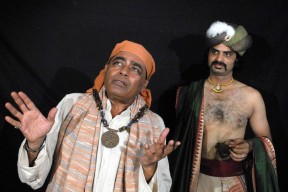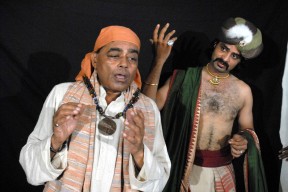When Bhanu Bharti, acclaimed theatre director and NSD alumnus, decides to stage a play, he doesn’t go looking for ‘interesting adaptations’ and ‘inspired scripts’. He doesn’t bother about reaching out to the masses with risqué comedies or flamboyant productions either. He chooses to write, instead, intense plays based on pertinent social issues that happen around him, events that fire his creative imagination and have the power to make the audience think beyond their comfort zone.
His latest offering, Tamasha Na Hua, which will be staged in Delhi next week is also bound to raise questions and trigger introspection. The production blends Rabindranath Tagore’s play Muktdhara with Gandhian ideals of freedom – it’s the story of a conflict around damming of the river Muktdhara which some view as a harbinger of development while others as a loss of freedom for the river.
“Isn’t this what we see around us? That’s what happened with Farakka barrage which dammed the river Ganga on the border of West Bengal affecting millions of lives downstream in Bangladesh. With China doing the same on Brahmaputra, this seems to be going on endlessly,” says the writer-director.
Choosing interesting formats – in this production, there is a play within a play – is one of the main tools that makes Bharti’s craft unique. He is known for exploring different presentation styles – his last work Doobi Ladki staged last year was a simple love tale but portrayed in a multi-dimensional setting of the supernatural and magical world of human complexities – and for interpreting complex themes to evolve an indigenous drama idiom.
He says, “In Tamasha Na Hua, there is a theatre group rehearsing one of Tagore’s most popular plays – Muktdhara. A discussion starts among the actors on the relevance of the play which leads to a serious debate about the freedom of men in the present political, technological and cultural context. Obviously, the debate remains inconclusive and the play unperformed.”
To give a little more insight into the storyline, to commemorate Tagore’s 150th anniversary, a theatre group is rehearsing ‘Muktdhara’ in which preparations are on to celebrate the completion of the dam on the streams of river Muktdhara. The dam is an innovation of Yantraraj Vibhuti who has worked for years to achieve the feat, and which has come about after many glitches and deaths. For Vibhuti, it is the victory of man’s genius over the forces of nature, but for the prince of Uttarkut, the land through which the river flows, it’s a political instrument to subjugate the rebellious people who live downstream.
The prince considers the dam a blasphemy against the spirit of God and Nature and, in the end, destroys the dam and frees Muktdhara by sacrificing his own life.
While rehearsing the same, an argument erupts among the actors about the relevance of the play in present times. This argument leads to the famous debate between Tagore and Gandhi, and the issue of man’s freedom in today’s scenario. The discussions then leads to many real issues faced today, like the Farraka barrage and its effect on Bangladesh agriculture and fisheries, Baglihar dam on river Chainab causing problems with Pakistan and larger questions of free economy and consumerist culture.
“This year, as we celebrate 150 years of Tagore, I felt that his ideologies merited a revisit in the context of the tumultuous modern times. This is my tribute to Tagore, the great Renaissance poet of India,” says Bharti, “Tamasha Na Hua is an attempt to provoke a dialogue about man’s plight in today’s world and to explore the possibility of the freedom of his body, mind and soul, which Tagore and Gandhi so keenly desired.”
While Bharti is hoping that the audience will embrace this latest offering as well as they have done his previous work – several of which have won prestigious awards – he might perhaps find it difficult to match the acclaim that he received for having discovered the Gavari, a tribal theatre form of Bheels of the Mewar region of Rajasthan. Or for the highly innovative production of Pashu Gayatri, Kaal Katha and Amar Beej, the last a remarkable theatrical work, synthesising tribal art with modern technique and sensibility.
He is also credited for discovering Bhuwaneshwar Prasad’s plays and staging them. He says, “It was a thrilling experience to discover such a wonderful playwright and writer who was so prophetic and so ahead of his time. Sadly, we have not yet given this revolutionary writer his due even in his centenary year.”
Though Bharti admits that while writing Tamasha Na Hua, he was influenced by Prasad’s style of “dramatic dialogues”, one is left in no doubt that the play will stand out for more than just that reason.
Tamasha Na Hua will be staged at Sri Ram Centre, 4, Safdar Hashmi Marg, New Delhi on June 28, 29, 30, at 6.30 p.m. Tickets are priced at Rs 100, 200, 300 & 500. Contact 09990756476.







